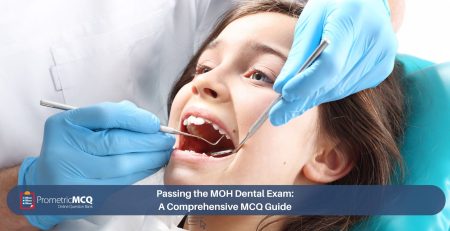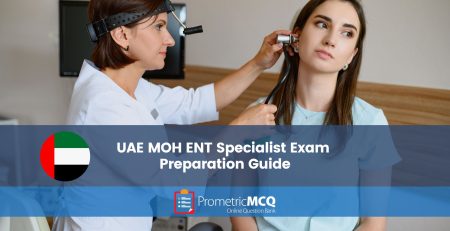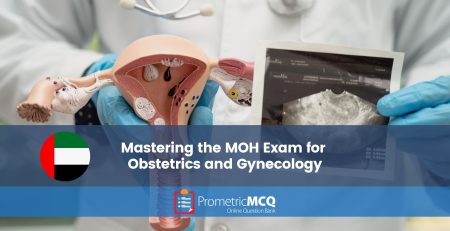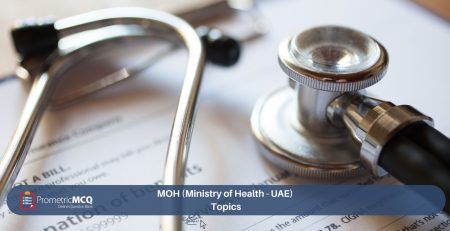
MOH Exam Syllabus for Nurses: A Complete Breakdown 2025
fatima@prometricmcq.com2025-09-24T16:48:01+00:00Table of Contents
ToggleMOH Exam Syllabus for Nurses: A Complete Breakdown 2025
For nurses seeking to advance their careers in the UAE’s dynamic healthcare sector, securing a license from the Ministry of Health and Prevention (MOHAP) is a critical step. This license is the key to practicing in the Northern Emirates, and at the heart of the licensing process lies the MOH Prometric Exam for Nurses. This is not just a test of textbook knowledge; it is a comprehensive evaluation of your clinical reasoning, critical thinking, and ability to provide safe, effective patient care according to international standards.
One of the biggest challenges for candidates is understanding the vast scope of the MOH exam syllabus. Without a clear roadmap, preparation can feel disorganized and overwhelming, leading to wasted time and increased anxiety. A successful approach requires a deep, strategic understanding of the exam’s blueprint—knowing which topics are high-yield and how they are likely to be tested. A focused study plan is the difference between walking into the exam with confidence and walking in unprepared. Our general guide on how to prepare for the MOH exam for nurses provides an excellent starting point for your journey.
This ultimate guide provides a complete, in-depth breakdown of the 2025 MOH exam syllabus for Registered Nurses. We will dissect each core domain, highlighting the most critical topics and offering insights into the types of clinical scenarios you will face. From mastering pharmacology calculations to understanding the nuances of patient prioritization, this article is your definitive resource for building a targeted and effective study plan. With a comprehensive 10-point FAQ, we aim to address all your questions and set you firmly on the path to success.
Key Syllabus Takeaways for the MOH Nursing Exam
- Patient Safety is Paramount: This is the single most important theme. Questions on infection control, medication safety, and fall prevention are guaranteed.
- Fundamentals are Foundational: A rock-solid understanding of the nursing process (ADPIE), therapeutic communication, and ethical/legal principles is essential.
- Think Like a Clinical Strategist: The exam tests your ability to prioritize care, delegate tasks appropriately, and manage time effectively in complex scenarios.
- Medical-Surgical Nursing is the Core: This domain forms the largest part of the exam, covering a wide range of common adult health conditions.
- Calculations Must Be Perfect: You must be 100% accurate in pharmacology and dosage calculation questions. There is no room for error.
Deconstructing the MOH Nursing Exam Pattern
Before diving into the syllabus, it’s crucial to understand the exam’s format. The MOH exam for nurses is a computer-based test (CBT) administered by Prometric, designed to assess your ability to apply knowledge in a practical setting.
- Format: Computer-Based Test (CBT).
- Question Type: 100% Multiple-Choice Questions (MCQs), usually with four options.
- Number of Questions: Typically around 100 to 150 questions.
- Duration: Approximately 2.5 to 3 hours. This requires excellent time management.
- Content Style: The questions are primarily case-based. You will be presented with a clinical scenario about a patient and asked to make a judgment about assessment, diagnosis, planning, implementation, or evaluation of care.
Approach every question by first identifying the core issue: Is this an airway problem? A safety risk? A circulation issue? A knowledge deficit? Categorizing the problem helps you eliminate incorrect options quickly.
The Complete 2025 MOH Nursing Syllabus: A Domain-by-Domain Breakdown
A successful study plan requires a systematic approach to the MOH syllabus. The exam is structured around the core competencies of a registered nurse. Mastering the topics in our MOH nursing exam MCQs is the most effective way to prepare.
| Core Syllabus Domain | Brief Description |
|---|---|
| Fundamentals of Nursing | The bedrock of nursing practice. Covers the nursing process, ethics, legal responsibilities, communication, and basic patient care. |
| Medical-Surgical Nursing | The largest and most comprehensive domain, covering the nursing management of adult patients with acute and chronic illnesses. |
| Pharmacology & Medication Administration | Focuses on medication safety, drug classifications, adverse effects, and, most importantly, dosage calculations. |
| Patient Safety & Infection Control | A critical domain testing knowledge of safety protocols, risk reduction, and the prevention of healthcare-associated infections (HAIs). |
| Maternal and Child Health (Pediatrics & OB/GYN) | Covers the nursing care of childbearing women, newborns, and pediatric patients through all stages of development. |
| Leadership, Management & Delegation | Tests your ability to prioritize care, manage resources, and delegate tasks appropriately to other members of the healthcare team. |
Deep Dive 1: Fundamentals of Nursing
This domain is the foundation upon which all other nursing knowledge is built. Do not underestimate its importance.
- The Nursing Process (ADPIE): You must be able to apply all five steps. For example, a question might give you patient data (Assessment) and ask for the most appropriate nursing diagnosis (Diagnosis) or the best goal (Planning).
- Ethical and Legal Principles: Understand concepts like beneficence, non-maleficence, autonomy, and justice. Be prepared for questions on informed consent, patient confidentiality (HIPAA principles), and advance directives.
- Therapeutic Communication: Know the difference between therapeutic and non-therapeutic communication techniques. Questions will often ask for the “most therapeutic” response to a patient.
- Basic Care and Comfort: This includes wound care (stages of pressure ulcers), mobility and positioning, nutrition, and fluid and electrolyte balance (signs of hypo/hyperkalemia, hypo/hypernatremia).
Deep Dive 2: Medical-Surgical Nursing
This is the heart of the exam. You need a broad understanding of the pathophysiology, assessment findings, and nursing interventions for common adult conditions.
- Cardiovascular: Management of Myocardial Infarction (MI), Heart Failure (HF), Hypertension, and Peripheral Vascular Disease. Be able to interpret basic ECG rhythms like atrial fibrillation and ventricular tachycardia.
- Respiratory: Care of patients with COPD, Asthma, Pneumonia, and Tuberculosis (TB). Understand ABG interpretation (acidosis vs. alkalosis).
- Endocrine: This is a high-yield area. Master the management of Diabetes Mellitus (Type 1 & 2), including insulin therapy, sick day rules, and recognizing/treating DKA and HHS.
- Neurological: Nursing care for patients post-stroke (CVA), with seizures, and increased intracranial pressure (ICP). Understand the Glasgow Coma Scale (GCS).
- Perioperative Care: Know the nurse’s role in pre-operative assessment, immediate post-operative care (airway management, vital signs), and preventing complications like DVT and wound infection.
Deep Dive 3: Pharmacology & Medication Administration
This is a zero-error domain. Your calculations must be precise.
- The “10 Rights” of Medication Administration: This is the core principle of medication safety.
- Dosage Calculations: Practice, practice, practice. Be able to calculate oral dosages, IV drip rates (gtts/min), and IV pump rates (mL/hr).
- Major Drug Classes: Know the common uses, side effects, and nursing considerations for key drug classes like anticoagulants (Warfarin vs. Heparin), antihypertensives (Beta-blockers, ACE inhibitors), antibiotics, and diuretics.
Frequently Asked Questions (FAQs) for the MOH Nursing Syllabus
The core clinical content across all three UAE health authorities is very similar, as they are all based on international nursing standards. The primary difference lies in the jurisdiction of the license. The MOH license is for the Northern Emirates. While the clinical focus is nearly identical, some candidates feel the DHA exam may have more questions on cultural diversity, while the DOH exam is known for its rigor. A nurse who has thoroughly studied this syllabus will be well-prepared for any of them.
The official result is only “Pass” or “Fail.” However, based on extensive candidate feedback, the unofficial passing benchmark is believed to be around 60%. To ensure success, you should aim to consistently score 70-75% or higher in your practice tests to create a safe buffer.
While not as large as the medical-surgical section, leadership, management, and delegation are critical and frequently tested components. You can expect 10-15% of the exam to focus on these topics, particularly prioritization questions (e.g., “Which patient should the nurse see first?”) and delegation questions (e.g., “Which task can be safely delegated to an Unlicensed Assistive Personnel?”).
The exam is not designed to trick you, but it is designed to test your critical thinking and ability to identify the *most correct* answer among several plausible options. The key is to carefully read the question, identify keywords (like “priority,” “initial action,” “further teaching is needed”), and use a process of elimination based on patient safety principles.
Do not try to memorize every single drug. Instead, focus on understanding drug classes. Create charts that list the class (e.g., Beta-Blockers), common drug endings (-olol), mechanism of action, key side effects, and major nursing considerations. For calculations, the only method is repetitive practice until you are fast and accurate.
They are very important. The MOH exam is for a general registered nurse, who is expected to have foundational knowledge across the lifespan. You must know pediatric vital sign norms, developmental milestones (Erikson, Piaget), and the principles of family-centered care. You can refer to international standards from organizations like the World Health Organization (WHO) for guidance on child health priorities.
Quality is more important than quantity, but a good target is to complete at least 2,000 to 3,000 high-quality MCQs from a reputable question bank. The key is to read the rationale for every single question, both correct and incorrect, to understand the underlying concepts.
Passing the exam makes you eligible for the UAE MOH license. You will receive an eligibility letter, after which you need to complete the DataFlow PSV (Primary Source Verification) process and secure a job offer from a healthcare facility in one of the Northern Emirates. Your employer will then activate your license.
No, the MOH licensing exam for general nurses is currently a theory-based, computer-based MCQ test only. There is no practical or OSCE (Objective Structured Clinical Examination) component.
The core principles of nursing remain constant, so the fundamental syllabus is stable. However, it is periodically updated to reflect the latest evidence-based practice, international patient safety goals, and clinical guidelines. Using study materials updated for 2025 is essential to ensure you are preparing with the most current information.
Conclusion: From Syllabus to Success
The MOH nursing exam syllabus is extensive, but it is not insurmountable. By breaking it down into manageable domains and focusing on high-yield topics, you can create a powerful and efficient study plan. Your success will be built on a foundation of core nursing principles, reinforced by a deep understanding of medical-surgical conditions, and cemented by flawless application of safety and pharmacology rules. Use this guide as your roadmap, commit to consistent practice, and you will be fully prepared to ace the MOH exam and begin the next exciting chapter of your nursing career in the UAE.
Ready to Master the Syllabus and Pass with Confidence?
Our comprehensive MOH Nursing Question Bank features thousands of MCQs, detailed rationales, and timed mock exams that cover every topic in the 2025 syllabus.










